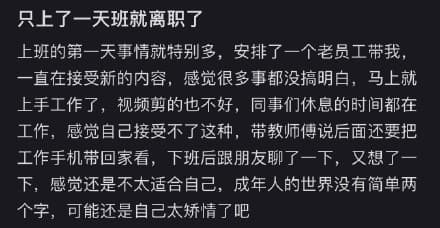Quitting Job After One Day: A Viral Weibo Post Sparks Discussion on Workplace Satisfaction and Resignation
A Chinese Twitter user recently shared a brief account of their first day at a new job and their subsequent decision to quit after just one day. The user, whose post has since gone viral on the platform, described a hectic work environment, feeling overwhelmed with tasks, and the expectation to work overtime.

26 February 2024
Many Weibo users have since weighed in on the post, with some commending the individual for making a swift decision and avoiding further discomfort, while others stated that it may have been too hasty. The original Weibo user shared the following account:
"On my first day at work, there were so many tasks to handle and an experienced colleague was assigned to train me. I was receiving a lot of new information and felt I did not fully understand some of the tasks, but was expected to start working on them right away.
The video editing was not up to par, and coworkers used their rest time to work as well. I felt I could not handle this kind of work environment, and when the supervisor mentioned that I would have to take work home, I began to reconsider if the job was suitable for me.
After discussing it with a friend, I ultimately decided to resign. I later realized that the adult world is not as simple as I had imagined, and perhaps I was being too sensitive." As the tweet gained traction, Weibo users added their perspectives on the situation. One user commented, "If you feel like it's not a good fit, it's better to leave sooner rather than later. Don't wait until you become comfortable and start working before realizing it's not for you. As an adult, there's no need to overthink things; make a decision and don't look back." Several users addressed the broader reasons why young professionals may contemplate quitting their jobs, including a lack of growth opportunities, low pay, and difficulties adapting to the workplace atmosphere. One user mentioned, "Having unrealistic expectations or not feeling like you fit in can lead to the desire to quit early on. If you're thinking about resigning, consider some of the legal aspects involved, such as when you might be able to exercise certain rights." A topic that gained attention in the comment section was the concept of not relying too heavily on one's employer.
One popular post reads: "Never treat your company like a parent or a savior. Your main purpose in joining a company should be to earn money. Don't believe the future prospects they paint for you, because it's just to entice you. If someone in the company talks about feelings, it's probably just to get away with paying you less."
As the thread continued, users also discussed some practical advice for those considering resignation, such as researching the company's policies and procedures and consulting the employment contract before making a decision. One user wrote, "Before submitting your resignation, make sure you understand the company's bylaws regarding termination and follow the appropriate steps. This way, you can avoid any possible repercussions from the company, while also protecting your rights." In a separate post, another user shared their personal experience with a similar situation: "I once quit a job just after the interview, because I was so busy on my first day, running around nonstop. During my lunch break, a colleague told me I was not being proactive enough, to which I simply replied, 'You can go to hell.' The older colleague seemed amused by it all.
Eventually, I was handed work tasks right away. The company's way of onboarding new employees was absurd. I left without any regrets and felt I had made the right choice." This user's story resonated with several others who shared their own work experiences. One user added, "I once joined a company, and on my first day, no one had any tasks prepared for me. An experienced colleague was assigned to train me, but when I asked for help, she said it was the busy season, and they didn't have time to teach me. Then, she said, 'If there's something you don't know, just ask.' This entire situation was ridiculous." Another user chimed in, stating that they continually think about quitting their current job. They asked for guidance on determining the best time to leave and also inquired about an ideal time to have children. They added that they were seeking to explore other career options and were seeking a zodiac-based analysis of their current situation. The original poster's account and the subsequent discussions on Weibo highlight the importance of workplace satisfaction and the potential consequences of making hasty decisions without fully understanding the implications. As more users shared their own experiences and concerns, the conversation evolved into a broader exploration of workplace dynamics, personal decision-making, and legal considerations related to resignation.
In recent years, Chinese authorities have been paying close attention to labor rights and seeking to address issues related to workplace mistreatment and contractual disputes. According to a report from CCTV News, several human resources departments have implemented performance evaluation systems, which can lead to inconsistencies and even the violation of employee rights. As a result, young professionals may face additional challenges when navigating their careers and assessing their job satisfaction. As the conversation surrounding the original post continues to grow, it serves as a reminder for both employees and employers to prioritize communication, understanding, and respect in the workplace, ultimately seeking to create a more harmonious and fulfilling environment for all parties involved. In conclusion, the viral Weibo post about someone quitting their job after only one day has sparked a wider discussion on workplace satisfaction, the importance of careful decision-making, and the various legal considerations involved in resignation. As users continue to share their own experiences and perspectives, the thread highlights the need for improved workplace dynamics and a greater emphasis on respect and understanding in the professional sphere. As the conversation evolves, it will be interesting to see if Chinese authorities and employers take notice and seek to address some of the concerns raised by users, ultimately striving for a more balanced and equitable labor landscape.




